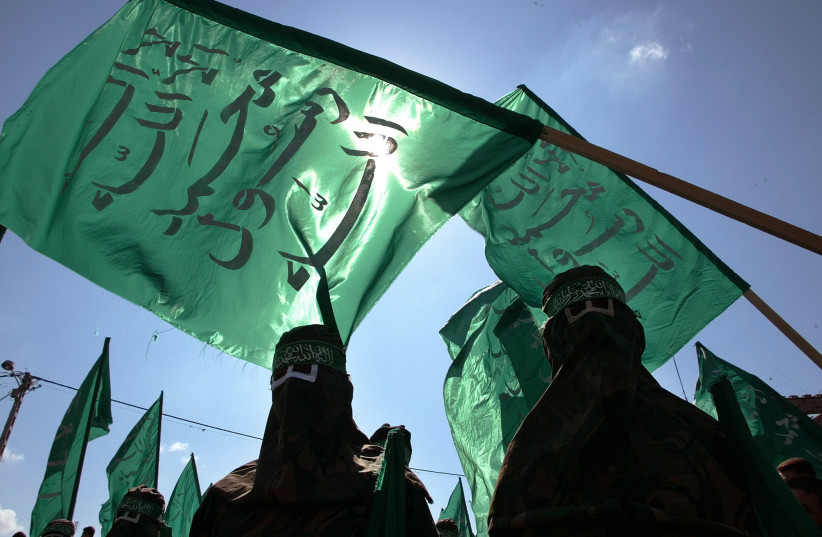Infighting among the leaders of the terrorist organization Hamas, including Hamas Gaza Chief Yahya Sinwar and Hamas chief Ismail Haniyeh, has led to a delay in the signing of a US-backed ceasefire and hostage exchange deal, The Wall Street Journal reported on Friday.
While arguments within the ranks of the organization that orchestrated the October 7 massacre are not new, such a probability is overshadowed by the amount of press coverage for the potential hostage deal.
This past weekend alone, hundreds of news articles, interviews, analyses and opinions were published around the world about the potential ceasefire and hostage deal. It has become a modern-day reality for Israelis and, indeed, for Jews worldwide to hang onto the precipice of this potential deal, counting the seconds until it is approved and those dear ones are brought back home.
In actuality, this delay is another facet of Hamas’s vile psychological warfare, taunting the country with the possibility of a return of those held for 120 days now in awful conditions, without winter clothes and very little food or drink.
Hamas’s local leaders are ready and willing to sign on to the deal, according to the WSJ, while their leaders, who have run away and are living lavishly abroad, are demanding more concessions from Israel in the potential deal.

Those are the same leaders who, alongside leaders from the Palestinian Islamic Jihad, have been preaching repeatedly that there will be no hostage return deal without a total ceasefire, something Israeli society and politicians are notoriously split on.
The three-stage truce that is currently on the table was procured in talks that took place early last week in Paris alongside American, Qatari, and Egyptian mediators.
The proposed deal
The proposed deal splits the hostages currently being held into three groups that will be released gradually into Israeli hands: First the civilians; then the soldiers; then the bodies of those murdered. It would roll out gradually over the course of 40 days, during which fighting would cease while Hamas would release the remaining hostages.
The US backs this deal wholeheartedly, as has been proclaimed by the Biden administration repeatedly. US Ambassador to the United Nations Linda Thomas-Greenfield said this past Wednesday that this deal is strong and encouraged the UN Security Council to increase pressure on Hamas to “make the right decision.”
US State Department Spokesperson Matthew Miller, as well, said that the US has “pursued this pause intensively” and has “made clear it is a priority of the United States; other countries have made clear it is a priority for all of these same reasons.”
The Qatari Foreign Affairs Ministry announced on Thursday that Hamas was showing signs of approving the deal, but as it happens, nothing has been finalized as of yet.
That same day, a Palestinian official close to the talks said Hamas was unlikely to reject a Gaza ceasefire proposal it received from mediators but would not sign it without assurances that Israel has committed to ending the war.
They said that they “expect that Hamas will not reject the paper, but it might not give a decisive agreement either.”
Miller, as well, said that Hamas is being noncommittal and explained that it had not given a response. Much like a teenager with a false shrug of impartiality, Hamas is taunting Israel with the power it is wielding due to Israel’s dedication to bringing back its citizens home safely – an empathy Hamas terrorists cannot relate to.
Multiple media outlets have been reporting for weeks now that the deal is expected to be sealed this coming week, and Israel is waiting in trepidation to be sure, both those in the streets, crying, “Bring them home now,” and those demanding the complete destruction of the terrorists who carried out this horrific attack on October 7.
Indeed, the Israeli government and Prime Minister Benjamin Netanyahu have been adamantly insisting that the IDF will not pull out of the Gaza Strip until “total victory,” i.e. the eradication of Hamas.
Most probably, both sides will concede and enter this agreement; indeed, as Larry David said, “A good compromise is when both parties are dissatisfied.”
But dragging this on, with so many Israeli lives on the line, is bordering on torture. It is the responsibility of governments worldwide to put immense pressure on Hamas to enter the deal immediately and put an end to this limbo.
